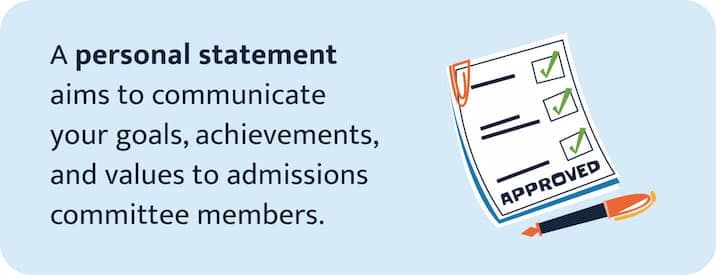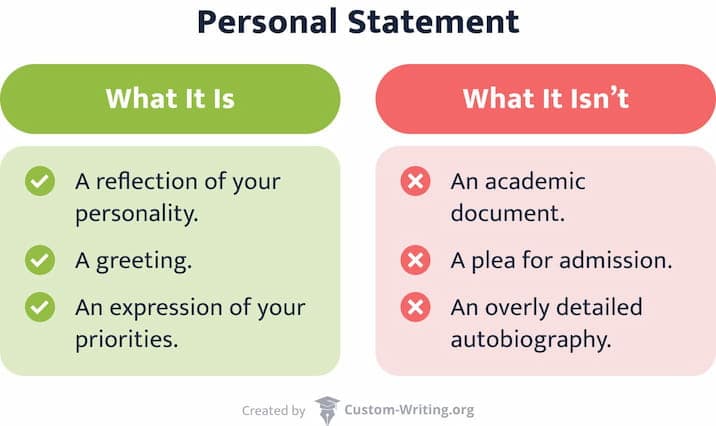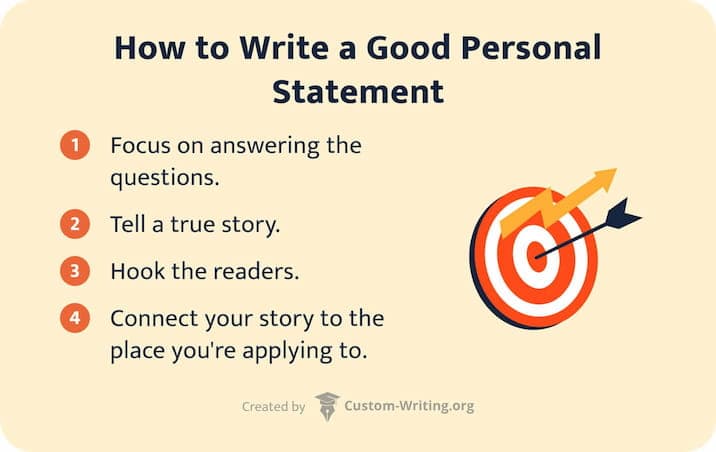Free Personal Statement Generator
People often have trouble writing good personal statements. If you're one of them, you've come to the right place! To help students like you, we've developed a free personal statement builder for university and job applications.
Our tool will save you time and give you an edge over other candidates. With its help, you'll forget countless failed attempts and wasted hours. Start making excellent statements now—try out our tool!
🔥 Benefits of Our Personal Statement Generator
There are many study apps online, but they all tend to lack essential attributes. In contrast to them, our app is packed with valuable features:
| 💸 100% free | We don't charge money for using our generator. Feel free to utilize it without limitations! |
|---|---|
| 🚀 User-friendly | Our app has a practical interface. It's very intuitive and easy to master. |
| 👍 Advanced AI | Forget about useless bots that can't write a sentence correctly. Our app is a true master of personal statements. |
| ⏳ Time-saving | Using it will make you less stressed and more attentive to details. |
| 🤩 Universal | Our tool can create a personal statement based on any goal imaginable. |
🤖 How to Use Our Personal Statement Maker
With the help of our tool, you can generate excellent statements of purpose in 3 easy steps:
- Enter your goal.
- Briefly explain your reason for pursuing it.
- Click "generate" and get a personal statement example!
Remember that the results provided by our tool are to be used for reference purposes only.
💡 Personal Statement Definition

An average personal statement is around 650 words long. Its main goal is to give the admissions committee an understanding of your personality, goals, achievements, and values. It aims to pique the committee's curiosity and entice them to pay closer attention to your application.
Personal Statement: What It Is & What It Isn't
Students often make mistakes when writing their personal statements. They tend to include unnecessary things and forget about fundamental aspects. To help you avoid confusion, we've prepared a detailed explanation of what a personal statement actually is:
✅ A personal statement is:
- A reflection of your personality. It shows your strong sides and your character alongside your most significant achievements.
- A greeting. It's a way of saying "nice to meet you" to the company or university analyzing your candidacy.
- An expression of your judgments and priorities. The company or school that you're applying to must know that you share its goals and mission.
❌ A personal statement is not:
- An academic document. Its goal is to get your audience to know you. That will require you to use a more direct tone of voice. For example, in a personal statement, you can use the pronoun "I," although academic essays usually don't allow that.
- A plea for admission. The goal of a personal statement is to show why you, of all people, deserve the committee's attention. It must directly show why you are the strongest candidate and what makes you unique.
- An autobiography. If you want your statement to be successful, include only your most prominent achievements. It shouldn't become the retelling of your entire life. Otherwise, the readers will get bored.

Personal Statement vs. Statement of Purpose
Personal statements are often confused with statements of purpose, a.k.a. the SOP. These two essay types have almost identical names, but they have many differences. Check the following table and see for yourself:
| Personal statement | Statement of purpose | |
|---|---|---|
| The goal | To make you stand out and show that you'll perfectly fit this organization or school. | To show how well you will fit the program you're applying. |
| Contents | Personal feelings, thoughts, and reflections. | Academic experience, accomplishments, and future plans. |
| Requirements | Be creative. Feel free to use an informal style. | Be specific. Avoid informal language. |
| Main traits | More autobiographical. | More serious and academic. |
✍️ 4 Steps to Writing a Compelling Personal Statement
Now that you know the theory behind personal statements, it's time to learn how to write them. Below, you'll find a handy guide to help you with that. Let's get started!
1. Before You Start
If you want your statement to be truly compelling and unique, you'll have to spend some time on preparations. When planning, keep in mind the following:
- Which practical facts will you include?
- What kind of personal details do you wish to share?
Spend some time identifying the most exciting details of your biography. To make the process easier, consider answering the following questions:
- Why does receiving the admission matter to you?
- What goals do you have for your future professional life?
- Do you possess any relevant experience?
- Which of your relevant life events can you freely discuss?
- What are you most proud of?
- What abilities do you have that make you an ideal student or candidate for the job?
- Which topics interest you personally?
2. Choosing a Topic
The most obvious topic for a personal statement is the description of your goals. But there are also other popular options you can choose from:
- Describe a situation in which you had to overcome a challenge, failure, or setback. After all, every difficulty we encounter is essential to our success in the future. How did the challenge affect you, and what did you learn from it?
- You can also talk about some of your beliefs or interests. Think back to a period when you opposed or followed a certain idea. What made you do that? What happened as a result?
- Tell about someone you respect, but refrain from writing a tribute. Instead, write about them from your perspective. How did they influence you? Why do they inspire you? What can you do to become more like them?
- Describe a topic, idea, or concept that fascinates you. What makes it so attractive to you? What would you do to learn more about it?
3. Write Your Personal Statement
This is the most critical step that will require all of your attention. Want to ensure that the writing process goes smoothly? Check out this list of valuable tips for writing a compelling personal statement:
| 🎯 Focus on answering the questions | Avoid using the same template for every organization that you're applying to. Each question the committee wants you to answer is a key to a successful personal statement. Make sure you provide compelling answers and carefully follow the instructions they give you. |
|---|---|
| 📚 Tell a true story | Consider demonstrating your best traits and achievements. Boring the admissions committee or trying to fake your biography is among the worst things you can do. Learn to promote yourself through your narrative, and people will pay more attention to your candidacy. |
| 🤯 Hook the readers | The real difficulty is to find ways to make your life story compelling. Try to concentrate on feelings and emotions you've experienced during challenging times. Feel free to embellish some of your life events to make them sound significant. Also, add catchy hooks and write a powerful opening. If you need help with that, try our hook generator to see some great examples. |
| 🏫 Connect your story to the place you're applying to | The event you choose to describe in your statement should ideally be related to the organization reviewing your candidacy. For example, if you're applying to a medical college, it would be excellent to mention how you assisted a doctor or volunteered in a medical setting. |
If you don't feel like following all these requirements, go ahead and use our free personal statement maker to get a perfect result in seconds.

4. Revising Your Personal Statement: Helpful Checklist
After you fill your statement with content and sew everything together, you can start the revision. At this point, it's vital to attentively proofread your text, check the grammar, and make sure everything is ready. To do it quickly and effectively, use the following checklist:
- Have you mentioned what your goals are in the first two sentences?
- Is your hook adequate and catchy?
- Have you talked about the place you're applying to?
- Have you voiced your values and views?
- Are the skills you've listed relevant to the organization or school you're applying to?
- Did you provide evidence to back up your statements?
- Have you adequately expressed your feelings and emotions?
- Have you shown what makes you an ideal applicant?
- Is your narrative interesting to read?
- Is your statement grammatically and logically correct?
If you've answered all these questions positively, it means your personal statement is complete! Congratulations!
We hope that you've learned many valuable things from this article. Feel free to try our free personal statement creator to save time and ensure a successful admission! We also recommend you try our reference generator and transition sentence tool.
❓ Personal Statement Creator FAQ
First, check the requirements given to you by the organization you're applying to. Then, gather the material and make preparations. Afterward, you can begin working on your statement. Once it's ready, proofread your results and send them to the organization you're applying to.
An average personal statement is about 300 to 650 words long. It has several paragraphs that flow logically and are well-written. The length of your personal statement will depend on the requirements given to you by the organization you're applying to.
Custom-Writing's AI-powered generator can create perfect personal statements 100% free. You can use it to make statements without limits. However, we strongly discourage you from submitting generated statements as your own. Use them for reference purposes only!
You have a limit of 47 lines or 4000 characters. Anything that is above 4000 characters will be discarded. That means you must stay within this number. Note that your personal statement can have fewer than 4000 characters.
🔎 References
- Writing the Personal Statement: Purdue OWL
- How to Write a Powerful Personal Statement: Indeed
- Statements of Purpose & Personal Statements: University of Nevada
- How to Write a Personal Statement: Coursera
- DOs and DON'Ts When Writing a Personal Statement: Center for Pre-Law Advising
- Personal Statements: University of Connecticut
